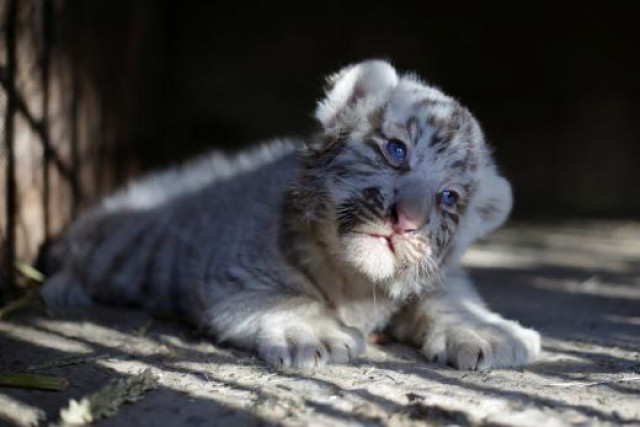Humans are bringing about sixth mass extinction on Earth
Study warns loss of biodiversity could 'substantially diminish the benefits that people derive from nature'

A newborn white Siberian tiger cub is pictured in its enclosure at San Jorge zoo in Ciudad Juarez, Mexico. PHOTO: REUTERS
Published in the journal Nature, the study found the rate at which mammals, birds and amphibians were becoming extinct, is higher compared to the time it took for the previous five mass extinctions – despite them being wiped out due to cataclysmic forces i.e. meteorite strikes and volcanic explosions.
As the population is expected to cross 10 billion by 2060 – considering it has increased by 130 percent in the last 50 years – the demand for resources will increase too leading to more endangering of species including 25 per cent of all mammals and 13 per cent of birds due to man-made problems such as pollution, poaching, loss of habitat.
The researchers, however, insist that there is hope if humans sought out to protect habitats, changed diets to less invasive food among others types of conservation.
WWF unearths online animal trade nexus
“The ever-increasing and unprecedented extent and impact of human activities on land and in the oceans over the past few centuries has dramatically reduced global biodiversity,” the scientists wrote in a one of a series of papers. “There is overwhelming evidence that habitat loss and fragmentation, over-exploitation of biological resources, pollution, species invasions and climate change have increased rates of global species extinctions to levels that are much higher than those observed in the fossil record.”
In another paper, the researchers reflected on the history of extinctions caused by humans. “Human-influenced extinctions began when modern humans moved out of Africa,” the team said.
“Successive waves of extinctions in Australia [50,000 years ago], North America and South America [10,000-11,000 years ago] and Europe [3,000-12,000 years ago] were driven largely by a combination of hunting by humans and natural climate change,” the paper read. “By 3,000 years ago, Earth had lost half of all terrestrial mammalian megafauna species [with a mass of more than 44kg] and 15 per cent of all bird species.”
According to the team, the annihilation of wildlife due to humans has ‘accelerated’ since 1500 AD. “Extinction rates for birds, mammals and amphibians are similar at present to those of the five global mass-extinction events of the past 500 million years that probably resulted from meteorite impacts, massive volcanism and other cataclysmic forces.”
They warned that loss of biodiversity could “substantially diminish the benefits that people derive from nature” and to protect “ecosystem services” there was a need to design policies that “secure the valuable and often irreplaceable benefits of biodiversity for future generations, even under conditions of rapid global change.”
The plight of Kamalia Wildlife Park
“Sufficient habitats will remain to preserve the viability of ... species in the long term and to guarantee that such habitats are well managed,” they wrote. “All species could benefit from the intensification of current conservation policies, as well as from policies that reduce underlying anthropogenic threats.”
The paper added that “developing and enacting such policies, however, will require an unprecedented degree of engagement between stakeholders, policymakers, natural scientists and social scientists.”
“Earth is capable of providing healthy diets for 10 billion people in 2060 and preserving viable habitats for the vast majority of its remaining species,” it said. “The benefits for biodiversity and humanity of pursuing these goals are great, and with forethought and timely action, these goals can be achieved.”
This article originally appeared on the Independent.



















COMMENTS
Comments are moderated and generally will be posted if they are on-topic and not abusive.
For more information, please see our Comments FAQ